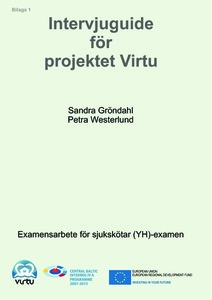Betydelsen av socialt stöd för den hemmaboende äldres hälsa : en intervjuguide utarbetad inom projektet Virtu
Westerlund, Petra; Gröndahl, Sandra (2011)
Lataukset:
Westerlund, Petra
Gröndahl, Sandra
Yrkeshögskolan Novia
2011
All rights reserved
Julkaisun pysyvä osoite on
https://urn.fi/URN:NBN:fi:amk-2011120917805
https://urn.fi/URN:NBN:fi:amk-2011120917805
Tiivistelmä
Detta examensarbete ingår som en del i forskningen i projektet Virtual Elderly Care Services on the Baltic Islands– VIRTU. Syftet är att reda ut om socialt stöd på VIRTU kanalen kan främja äldre deltagarnas hälsa.
Målet är att utveckla en intervjuguide för professionella/studerande inom social- och hälsovården för datainsamling av de äldre deltagarnas upplevelser om hurdant stöd som kan förverkligas virtuellt och vilken betydelse socialt stöd har för den hemmaboende äldres hälsa.
Arbetsmetoden är produktifierat examensarbete där produkten, intervjuguiden, kommer att användas som verktyg för datainsamling då det görs fallstudieundersökningar inom Virtuprojektet. I utvecklandet av guiden användes metoden kvalitativ forskningsintervju eftersom intervjuerna skall följa den modellen.
Resultatet av arbetet består av två delar. En teoridel som baserar sig på relevant litteratur och aktuell forskning och som utgör den teoretiska referensramen för arbetets praktiska del, intervjuguiden. Intervjuguiden innehåller förutom relevanta frågor även konkreta anvisningar för själva intervjusituationen. I beaktande tas intervjuarens roll, intervjumiljö och bifogat finns även förslag till följdfrågor. This thesis is part of the research project Virtual Elderly Care Services on the Baltic Islands- VIRTU. The aim is to ascertain whether social support on the VIRTU channel can support elderly participants' health.
The goal is to develop an interview guide to be used by professionals/students in social and healthcare for collecting data about the older participants' experiences of what kind of social support that can be given virtually and what meaning social support have on the health of the elderly living at home.
The thesis results in a product, the interview guide. The guide will be used as a tool for data collection when case study research will be performed in the Virtu project. In developing the guide qualitative research interview was used as a method because the interviews are planned to follow that particular interview model.
The thesis consists of two parts. A part based on relevant literature and current research that forms the theoretical framework for the practical part of the thesis, the interview guide. The guide contains relevant questions and specific instructions for the interview situation such as the interviewer's role and the interview environment. There are also suggestions for optional follow up questions.
Målet är att utveckla en intervjuguide för professionella/studerande inom social- och hälsovården för datainsamling av de äldre deltagarnas upplevelser om hurdant stöd som kan förverkligas virtuellt och vilken betydelse socialt stöd har för den hemmaboende äldres hälsa.
Arbetsmetoden är produktifierat examensarbete där produkten, intervjuguiden, kommer att användas som verktyg för datainsamling då det görs fallstudieundersökningar inom Virtuprojektet. I utvecklandet av guiden användes metoden kvalitativ forskningsintervju eftersom intervjuerna skall följa den modellen.
Resultatet av arbetet består av två delar. En teoridel som baserar sig på relevant litteratur och aktuell forskning och som utgör den teoretiska referensramen för arbetets praktiska del, intervjuguiden. Intervjuguiden innehåller förutom relevanta frågor även konkreta anvisningar för själva intervjusituationen. I beaktande tas intervjuarens roll, intervjumiljö och bifogat finns även förslag till följdfrågor.
The goal is to develop an interview guide to be used by professionals/students in social and healthcare for collecting data about the older participants' experiences of what kind of social support that can be given virtually and what meaning social support have on the health of the elderly living at home.
The thesis results in a product, the interview guide. The guide will be used as a tool for data collection when case study research will be performed in the Virtu project. In developing the guide qualitative research interview was used as a method because the interviews are planned to follow that particular interview model.
The thesis consists of two parts. A part based on relevant literature and current research that forms the theoretical framework for the practical part of the thesis, the interview guide. The guide contains relevant questions and specific instructions for the interview situation such as the interviewer's role and the interview environment. There are also suggestions for optional follow up questions.
